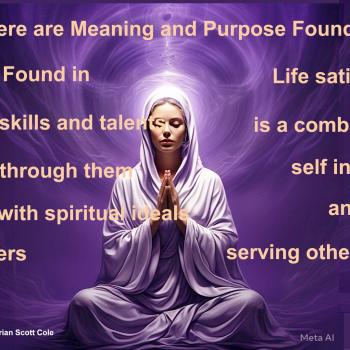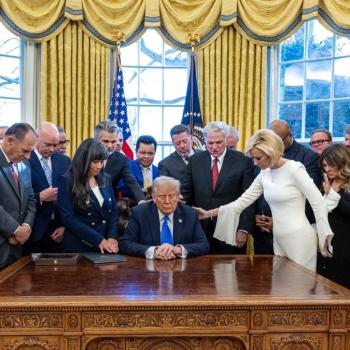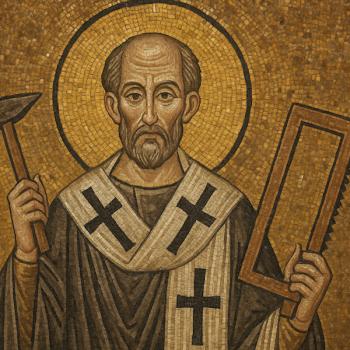Lectionary Reflections
2 Kings 2:1-12 (13-25)
February 15, 2015
It is, of course, Transfiguration Sunday, that day when we attempt to celebrate that weird story in the gospels where Jesus becomes "dazzling white," which implies, I presume, that that was not his usual color, despite so many American Christians depicting him so. He is revealed to the awed and rather foolish disciples as superior to both Moses and Elijah who, after a brief chat on the mountain, vanish leaving Jesus alone as the one of whom God enjoins us all, "Listen to him!" Not bad advice, that, albeit not that easy to do, as the succeeding two millennia have made all too clear. I presume that most of you will rush off to that story today, and for that I hardly blame you.
Still, this column is called "Opening the Old Testament," so open it I shall. Two texts from the Hebrew Bible are available for perusal today, 2 Kings 5, that rich and wonderful account of the healing of an enemy general of his skin disease through the power of a prophet, and 2 Kings 2, a tale of Elisha's accession to the role of prophet after the dramatic disappearance of his mentor, Elijah, who is wafted into the sky in a flaming chariot drawn by fiery horses. (You might listen to Felix Mendelssohn's marvelous setting of this scene in his "Elijah" to get the proper feel for it.) I elect today to discuss the latter text, since it is perhaps less read than its companion piece.
2 Kings 2:1-12 is a fascinating way to approach the transition from Elijah to Elisha. Elijah has done many marvelous deeds as Israel's prophet — from raising a dead boy to life, to saving the boy's mother from starvation, to confronting a horde of Baal prophets on Mt. Carmel and vanquishing them in the Super Bowl of prophecy, and then learning that he is finally not the only prophet left in the land, but is one of many who have "not bowed the knee to Baal." But his time of service comes to an end, and his protégé, Elisha, is about to take over the task.
Instead of a simple transfer of prophetic power, 2 Kings 2 describes a rather painful and personal process of witnessing the end of one's master and being taunted about it all by a gang of lesser prophetic "wannabes." Again and again, Elijah tells Elisha that YHWH has led him to leave for a different part of the country and that Elisha is not to join him there. Every time Elijah says that, Elisha refuses and follows along. And each time he does so, "the company of prophets," presumably a passel of disciples who wish they had been chosen as Elijah's successor, taunt Elisha with the phrase, "Do you know that today YHWH will take your master away from you?" And each time they thumb their noses in this very unpleasant way, Elisha responds, "I know; so shut up," to read it rather more directly than it usually is heard. Clearly, Elisha is ticked off at this gang, and wishes he could be alone with Elijah to see what it is his new prophetic life will be about.
Finally, Elijah asks his pupil what he, Elijah, may do for him before he is "taken away" (2 Kings 2:9). Elisha responds, "Please let me inherit a double share of your spirit" (2 Kings 2:9). Apparently, this is a difficult request, and Elijah adds a test to its possible fulfillment. If Elisha literally sees Elijah's disappearance from him, then he may get what he asks for; if he does not see, there will be no double spirit portion for him. But Elisha does indeed witness the miraculous event of the fiery chariot and its ascent into the sky with Elijah at the reins, and he cries out, "Father, father! The chariots of Israel and its horsemen," meaning that the nation's prophets are in reality the source of national power rather than its actual weapons of war.
Three odd events now follow, and for me they tell a very complex tale of the role of prophets in any age and the danger of would-be prophets in every age. Elijah first picks up the mantel or tunic that has fallen from Elijah during his hasty departure. This is the prophetic garb that announces the presence of a prophet of God. However, it will soon be clear that clothes alone do not a prophet make.
Elisha looks every inch the prophet first as he snatches the tunic, strikes the water of the Jordan, and the water divides, just as Elijah had done before his leaving (2 Kings 2:8). By this act, Elijah announces that the power of Elijah now rests on him. And the gang of prophets responds accordingly, declaring, "The spirit of Elijah now rests on Elisha" (2 Kings 2:15). But now they further demand that the new prophet send out a search party in the attempt to discover the missing Elijah. This, as Elisha knows well, is futile; he himself has seen his master fly into the sky and knows he will not be returning from there. So he at first rightly responds, "No, do not send them." But we are then told, "But when they urged him until he was ashamed, he said, 'Send them'" (2 Kings 2:17). In other words the prophetic gang demands that Elisha act in ways he knows to be ridiculous and a waste of time, but because he is finally "ashamed" at their demands he gives in, all the time knowing that no one will find Elijah on this earth.





